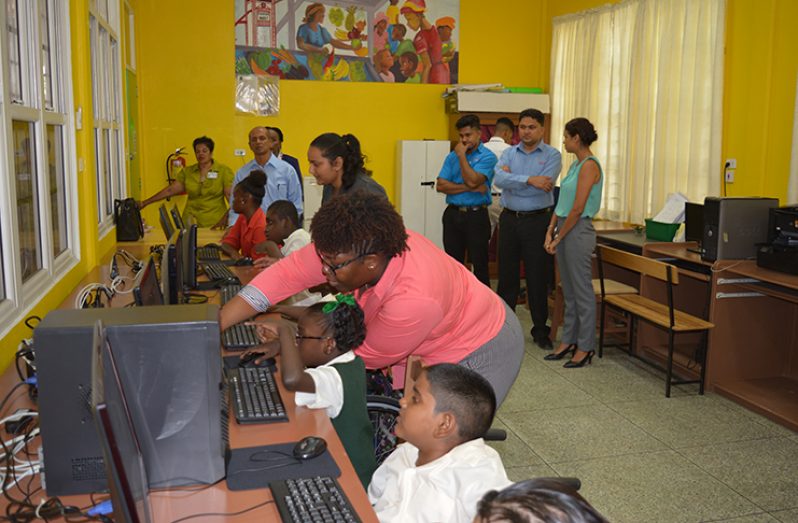– Ptolemy Reid Rehabilitation Centre receives new computer lab
GUYANA is gradually closing the gap when it comes to providing learning opportunities for physically challenged students through Information and Communication Technology (ICT).
This was reinforced on Thursday when the Ptolemy Reid Rehabilitation Centre received a Computer Smart Lab courtesy of computer giant STARR Computers.
The Computer Smart Lab includes a computer system, six monitors, keyboards and mouse, APC backup battery and a smart lab kit.
At the simple ceremony at the centre’s Carmichael Street, Georgetown computer lab, Rehman Majeed, General Manager of STARR Computer said the lab was designed to be energy efficient with low maintenance.
“The lab will make a major contribution for the learning and development of skills. This is my first visit here and I am thoroughly impressed at the work of staff and management. The results are shown in its modern features, the organisation, persons in the private sector should visit and they may learn a lot,” Majeed said.
He commended the staff at the Information Technology Department for doing an exceptional job with the children and the maintenance of systems.
According to Majeed, every child, despite challenges, physical or otherwise, can become masters in their field of choice, once they are empowered and given the opportunity to do so.
Rehabilitation Officer, Hyacinth Massay said the centre is extremely grateful for the kind gesture since there was no request made for it.
Davie Beepat – one of the rehab teachers – said the new computer laboratory will help in the implementation of the curriculum since the children at the centre learn by audio and visual.
BETTER THAN CHALK AND TALK
“When they see things they learn and remember it better than chalk and talk. The keyboard also helps in the children identifying numbers and letters. There will also be new software in use which will help them in speech therapy and motor skills, some of the more mature students from the vocational training centre would be trained to duplicate documents and prepare them for the world of work,” Beepat explained.
Statistics from the National Commission on Disability (NCD) reveals that 15 per cent of persons with disabilities have never attended school and the proportion dramatically increases to 42 per cent for those under the age of 16.
The commission noted that access to education can be limited, or entirely prevented, for persons with disabilities.
The data gathered from the survey identifies transportation, financial constraints, attitudes (individuals, peers, parents and teachers), teaching and care provisions, curriculum and physical access as factors that create barriers to education.
Speech therapist, Joan McAllister said that there are many devices, technology and applications that can assist a child with speech.
“If a child isn’t verbal, they can communicate using these devices, in this case they can type onto the computer software whatever they want to say and communicate to someone and it will repeat it for them, it also helps in socialising,” the speech therapist said.
She explained that a group of children can take turns in communicating with each other using the computer.
“This will expand horizon in terms of speech and it will also help with occupational therapy because it will assist with their motor skills and using the keyboard to communicate,” McAllister said.
The World Health Organisation (WHO) estimates that about 10 per cent of a population usually lives with some form of disability. Here in Guyana, the Public Health Ministry estimates that about seven per cent of the population lives with some form of disability.
Guyana’s current education facilities face challenges in providing a continuation of education facilities for persons with disabilities, particularly post-primary.
According to the National Commission on Disability, a survey involving 1,500 persons revealed that only 16 per cent of persons between the ages of 11 and 18 years received any form of secondary education (including vocational).
RENEWED EFFORTS NEEDED
The results highlight the need for renewed efforts to expand provisions, both within mainstream and specialist education and training providers, in all regions in Guyana.
Marcia Thomas, head of Information and Communication Technology at NCERD, said contrary to perceptions, ICT has always played an integral role in meeting the needs of children with learning disabilities through the use of learning software geared at improving their performances.
“What we are now concentrating on, is making sure that our teachers and students are ready for the world of work. Our teachers being able to teach ICT at various levels and our students being ready for what’s coming,” she said.
The Ptolemy Reid Rehabilitation Centre provides rehabilitation services for over 100 children and 30 adults annually, while its daycare service provides care for up to 35 children and nine residents. Another component of the facility, the Harold B. Davis School has 45 students enrolled.
The centre was originally established in January 1967, by the Ministry of Health to provide rehabilitative services for those children who had suffered residual paralysis following the 1960 and 1964 poliomyelitis epidemics.
The institution has since developed a comprehensive programme for rehabilitation for children with various types of physical and other developmental disabilities.
It currently offers services such as physiotherapy, special education, speech therapy, occupational therapy, counselling and educational services for parents of children in rehabilitation programmes and provisions for orthotic and prosthetic appliances for the physically-disabled in Guyana.



.jpg)










